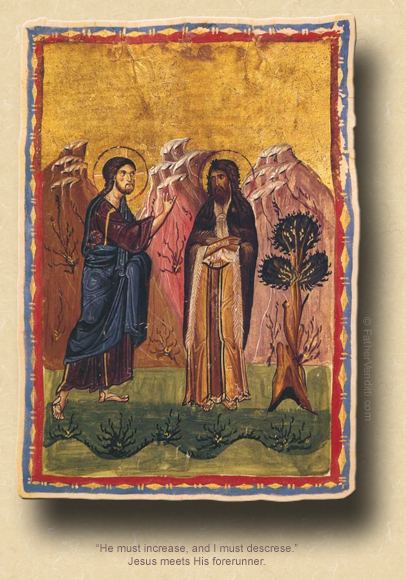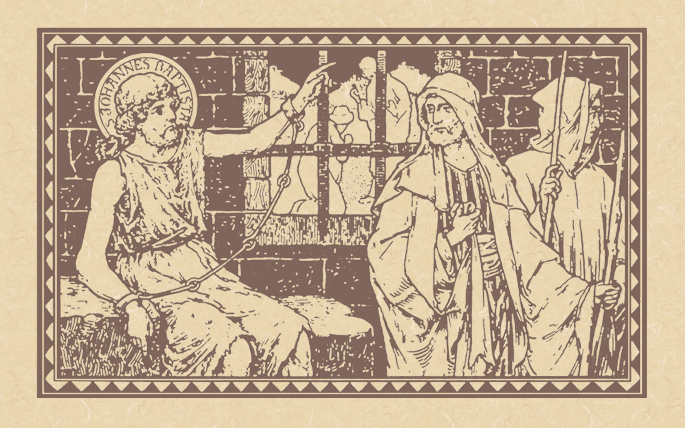He Must Increase; I Must Decrease.
The Saturday after Epiphany.
Lessons from the feria, according to the ordinary form of the Roman Rite:
• I John 5: 14-21.
• Psalm 149: 1-6, 9.
• John 3: 22-30.
The Fourth Class Feria of the Blessed Virgin Mary on Saturday.
Lessons from the common, according to the extraordinary form of the Roman Rite:
• Titus 3: 4-7.
• Psalm 44: 3, 2.
• Luke 2: 15-20.
The Saturday after Theophany; and, the Feast of the Holy Martyr Polyeuct.
Lessons from the pentecostarion, according to the Ruthenian recension of the Byzantine Rite:
• Ephesians 6: 10-17.
• Matthew 4: 1-11.
FatherVenditti.com
|
 9:05 AM 1/9/2016 — This last day of the Epiphany season brings us back, appropriately enough, to the Baptist, today's lesson from Saint John presenting to us the concern of some of John's disciples that Jesus, whom we are told has also begun to baptize, is stealing some of John's thunder. 9:05 AM 1/9/2016 — This last day of the Epiphany season brings us back, appropriately enough, to the Baptist, today's lesson from Saint John presenting to us the concern of some of John's disciples that Jesus, whom we are told has also begun to baptize, is stealing some of John's thunder.
This passage always reminds me of something Saint Augustine said in the 4th century on how the Church decided on the date for celebrating the birth of John the Baptist: clearly, no one knows for sure when so many of these events actually occurred; and, he points out that the date for celebrating the Baptist's birth, which is in June, was chosen because of its proximity to the Summer Solstice when the days begin to grew shorter, as opposed to the Nativity of our Lord, which corresponds to the Winter Solstice when the days start to grew longer, which he says is consistent with the remark made by John the Baptist in today's Gospel lesson, whereupon being told that Jesus has begun to baptize as he was, says, “He must increase; I must decrease” (John 3:30 NABRE). Which, when you think about it, is the quintessential statement of the interior life for the Christian: our goal should be to reproduce in ourselves the life of Christ so perfectly that we ourselves begin to disappear and Christ begins to show through us in perfect purity.
That, of course, is an ideal rarely obtained except by the saints. Some of you, I'm sure, are familiar with the life of the Little Flower; her “little way,” as she called it, was really nothing more than this spiritual principle so simply and perfectly expressed by the Baptist in John's Gospel: “He must increase; I must decrease.” But, as I said, it's a rather lofty spiritual goal; and, with all the pragmatic concerns we have to deal with every day—in our jobs, with our families, in the daily spiritual combat that is Christian living—it's very difficult to even think of achieving this lofty goal; unless, of course, we're going to follow the lead of the Desert Fathers and retreat into a hermitage somewhere to live out our lives, but that is not the choice that any of us have made.
But there is a way that we can actually do this to a degree, and it was very simply and beautifully put by a saint canonized not too many years ago, and that's Saint Josemaría Escrivá, and I've quoted this line to you before. He said that, for those of us in the world, whether we be lay people or priests, it is enough to strive for the goal that, when others see us act or hear us speak, they would be able to say, “That person has read the life of Jesus Christ.”
During these dual seasons of Christmas and Epiphany we've been treated to so many lofty commemorations of events with deep theological significance. We venerated the Mother of God as She received from the Angel the Divine commission to be the portal of salvation and give birth to God upon earth. We adored the Infant in the cave at the Nativity. We offered the gift of our lives lived in grace along with the spiritually symbolic gifts brought by the Magi: gold for the King, frankincense for the High Priest, and myrrh for His burial. Tomorrow, the Epiphany season will end with the Feast of the Baptism of the Lord, and we will marvel and rejoice at the appearance of the dove and the announcement of the Father’s approval; but, the Gospel doesn’t stop there, and neither should we. Having experienced all of these things—bringing them about by His Divine will—Jesus the Man will now put sandals on His feet, throw a pack on His back, and begin to trudge the width and breadth of Galilee preaching the evil of sin and the need to do good. And if we want to be counted as His followers, which I'm sure we do, then we have to go along. The word, “Christian,” does not mean “believer in Christ,” although that is implied; what it really means is “follower of Christ.” And one cannot follow simply by believing and standing still. Following requires movement; it requires doing; it requires living.
To believe is easy. It doesn’t cost anything simply to believe. The Disciples of the Lord were all too eager to believe in Him in the beginning. Having lived all their lives in subjection and destitution with nothing to give them hope, He could have told them He was Popeye the Sailor Man and they would have believed Him. But there’s an interesting thing that happens in chapter six of Saint John’s Gospel. All of a sudden Jesus starts to turn the tables on these so-called believers when He starts to outline for them exactly what price they will have to pay for following Him, as he speaks about His own death and the persecutions to come. Saint John sums up the whole episode with his characteristic and poetic economy of words, saying, "After this, many of his disciples went back to their old ways, and walked no more in his company" (John 6: 67 Knox).
That’s a temptation that we all share. We can come here day after day, praying the Holy Sacrifice of the Mass with as much devotion as we can muster, swearing to everything believed and taught by the Church of Christ, and all the while thinking that these are the things that make us Christians. But how are we living? What is it that we do when we’re not here? Do we actually live the way Jesus showed us and taught us to live—the way His Church continues to show us in his name through the Apostles? Are we really followers of Christ, or are we simply spectators in the bleachers, watching the world go by, contenting ourselves with the false security that we believe in all the right things?
I don't have to tell you that the world in which we live does not make it easy to be a follower of Christ. Maybe we’re not under threat of being arrested, tortured and killed like our Lord’s own disciples were;—like so many Christians are in other places around the world; like all Christians were for the first 300 years of our Church’s history—but, certainly the values our Church believes and teaches, and the way of life we are supposed to follow as Christians, are not the values and the ways of the world around us. Christ asks us to live in the midst of this world without being a part of it, and that’s not easy. We are tempted every day, and often we fall. The secret to surviving it all with our faith intact is to take as our motto the Baptist's last words in today's lesson: “He must increase; I must decrease.”

|

